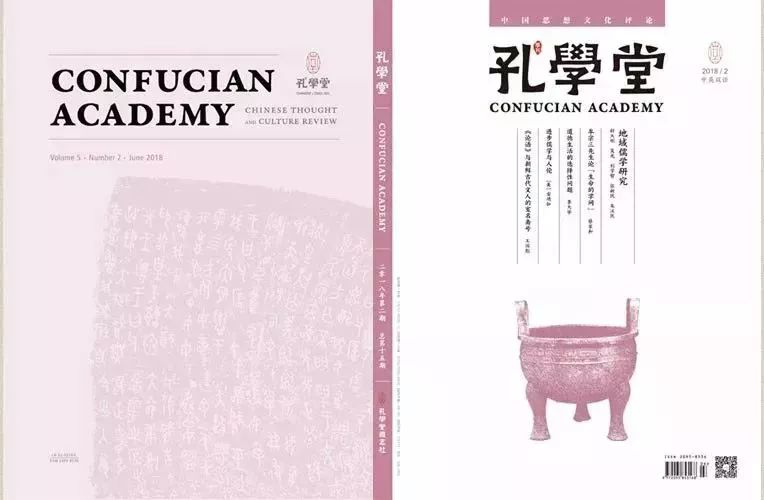


CONFUCIAN ACADEMY
Chinese Thought
and Culture Review
VOLUME 5 ·Number 2 ·June 2018
CONTENTS
SPECIAL THEME: REGIONAL CONFUCIAN STUDIES
Introduction to the Special Theme
Shu Dagang
Shu Dagang
Zhu Hanmin
Liu Xuezhi
ACADEMIC FORUM
Tsai Chia-he
Li Dahua
Wu Zhu
OVERSEAS CONFUCIAN STUDIES
Stephen C. Angle
ANALECTS STUDIES
Hu Haidi
Wang Guobiao
Introduction to the Special Theme
Shu Dagang Professor and PhD supervisor of International Confucian Institute at Sichuan University
Heaven and Earth spell out the great patterns of nature, and humans conceive their many ingenious thoughts about the world. Owing to diverse geographic environments, economic conditions, cultural traditions, and prevailing social customs, people tend to view, understand, and interpret the world from their own perspectives. Hence the varied regional cultures across China, which have fostered generation aft er generation of great minds and scholarship, and formed a great many regional academic schools. As regional cultures are the gems and jewels that add brilliance to the national cultural treasure house, regional academic schools constitute the beams and pillars that buttress the great mansion of the national academia. It can be said that these regional cultures and academic schools converge into the national academic mainstream with shared values and common beliefs, and at the same time, they provide actual infl uence and guidance concerning local socio-cultural construction and development. A culture gains splendor from its kaleidoscope of colors and varieties, and academic scholarship advances by pursuing individuality and distinction from others. Th erefore, diversity and dissimilarity of regional scholarship oft en prove to be the vigorous kinetic energy that boosts overall academic innovation and creative transformation. Th e Qilu School of classical Confucianism that originated in Shandong of eastern China brought about a great nationwide intellectual enlightenment. Mozi challenged Confucian doctrines and proposed the condemnation of fatalism and music, which began the prelude to the contention of a hundred schools of thought in the preQin period. The School of Shu in China’s southwest pioneered a new tradition of classical learning by integrating Confucian and Daoist ideas into a unified system. The Guanzhong School, active in the central plain of Shaanxi, brought fresh breath to Neo-Confucianism by advocating harmony between Heaven and the human, and taking all people as one’s brothers and sisters and all things as one’s kin. Th e School of Zhe (Zhejiang in southeast China) ushered in a new era of learning with its focus on social realities and balancing utility with morality. Th e School of Xiang (Hunan in central China) fostered revolutionary scholars who were in the vanguard of modern intellectual change, but who already possessed a sense of responsibility for the development of the country. The thriving of regional intellectual schools often heralds oncoming great historical changes and overall academic prosperity. The new ideas and theories burgeoning from local scholarship have always signaled the strongest voice of a new era. For this reason, the study of Chinese academic culture must not ignore regional culture and local academic scholarship. While the common or typical characteristics of a culture are usually normative and conservative, regional or local cultures tend to be more open-minded and vigorous. Th erefore, regional cultural and academic studies might provide us with a handier approach and more reliable guarantee for academic innovation as well as for cultural continuity and development. In our present promotion of cultural progress, cultural self-consciousness, and cultural self-confi dence, it is an indispensable task to strengthen regional academic studies, compare their characteristics, and discover their distinctive values, especially by means of cross-regional exchange, mutual learning, complementary activities, and interaction between these regional academic schools. Taking this into account, the Guiyang Confucius Academy had its Spring Forum on April 30, 2018 focused on regional Confucian studies, which has received the endorsement of eminent scholars like Wu Guang吴光, Liu Xuezhi刘学智, Zhang Xinmin张新民, and Zhu Hanmin朱汉民. They shared the best findings of their related research and offered incisive and inspiring insights into this issue. At the request of our readers, we are now pleased to publish their discussion